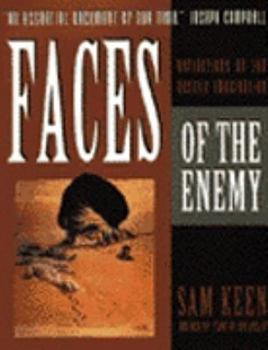Faces of the Enemy: Reflections of the Hostile Imagination
Select Format
Select Condition 
Book Overview
This book shows how ordinary and seemingly decent people can be stirred to hate and even to kill their neighbours, using the twisted caricatures of propaganda posters, biased cartoons, and distorted... This description may be from another edition of this product.
Format:Paperback
Language:English
ISBN:0062504673
ISBN13:9780062504678
Release Date:January 1991
Publisher:HarperCollins Publishers
Length:176 Pages
Weight:0.95 lbs.
Dimensions:0.5" x 7.2" x 9.2"
Customer Reviews
5 ratings
Quick review and comment on previous review by Joseph Biskup
Published by Thriftbooks.com User , 18 years ago
This is an excellent book for someone who would like to meditate on or provoke discussion on the connection between the individual psyche and warfare as a social phenomenon. I think reviewer Joseph Biskup was right is saying that this is more of a philosophical treatise than an academic monograph, as citations are totally absent. But I would add that it is also interesting from a psychoanalytic perspective, as much of the structures that underly his psychological assertions about the individual are based on the Freudian tradition. I used the chapter "The Psychology of Enmity" in a class on post-colonial criticism and theory recently with incoming university freshmen, and it was a hit (if a bit overwhelming as an introduction to college). The graphics of propaganda from around the world are great conversation fodder. One point on which I would disagree with Joseph Biskup's review. He argues: "There seemed to me to be several contradictions in this book; for me the most glaring was the following. On page 178 the author states "we are not instinctually sadists...Homo hostilis must be created by the media and the institutions that subject him to constant indoctrination". From this (and the rest of what he states on this page) it seems to me an obvious conclusion that without extra effort we would naturally revert to a more peaceful state; that there is a natural energy already pushing us in that direction. However, on page 184 the author then states, "Since the process of education for paranoia and warfare requires a total social effort, we must assume that the effort to create a compassionate psyche and society will require a similar or greater effort." Such obvious contradictions should not be in a well thought-through book. " This criticism assumes that the subject returns to his 'natural state' after an influential stimulus stops. I'm not sure why Biskup assumes this. I believe that Sam Keen's argument in the book is based on the idea that humans, once indoctrinated in the discourse of warfare to the degree 'we' are, do not just revert to a natural peaceful state. Also, Keen doesn't say positively that we are naturally good or peaceful--just that peacefulness or warmongering can be taught equally well by concerted social efforts to educate and influence through arts and media. Of course Keen is speaking idealistically--that's the goal of his book. It's not a policy analysis or recommendation, but a way of inciting people to think outside popular assumtions of psychic territoriality and the paranoid construction of an imagined other on which to project our hatred and seek to destroy. Although I agree with Biskup that policy analysis and change is needed as a complement to Keen's kind of thinking, I don't think that the criticism that Keen doesn't accomplish this is a valid criticism--a book can only do so much.
What we need to remember
Published by Thriftbooks.com User , 20 years ago
Whatever side of the war argument the reader lands on, this book will provide necessary information to supplement the discussion.This book addresses the way past wars have been intensified by demonizing the enemy beyond whatever real reasons caused the wars.The history presented in this book -- the posters, the commentary, the pictures -- is not commonly taught. The author may have a point a view with which the reader disagrees, but the examples presented should be known if society is to make reasoned decisions on behavior and not just react to base emotions.I recommend this book highly for a look at an aspect of history that we often quickly forget once the battles are over.
It explains a lot of everyday behavior.
Published by Thriftbooks.com User , 25 years ago
Why do Creationists quote Evolutionists as saying, "Anything goes"? Why does any teacher who advocates a child-centered approach get branded with the "Montessori" label? Why is any adult who enjoys children considered a potential threat? "Faces of the Enemy" explains not only what you see in the newspaper, but what you see all around you.
Amazing
Published by Thriftbooks.com User , 25 years ago
This book should be required reading for anyone that has the slightest interest in international affairs. I wouldn't go so far as to say this book changed my life, but I would say that it radically altered my thinking and lead me down paths of human understanding that I wouldn't traveled if not for this book.
the enemy isn't without, he's within...
Published by Thriftbooks.com User , 26 years ago
One of the best books on propaganda and psychological projection ever written, extended treatment of Jung's theories on the "shadow side" as well as many full color illustrations of propaganda and war posters over the centuries and quotes from hundreds and hundreds of sources. As the author reminds us, the enemy isn't without, he's within...




